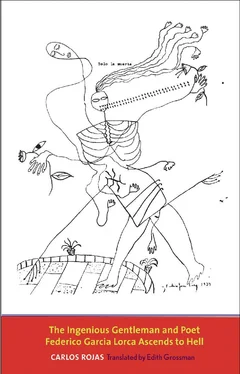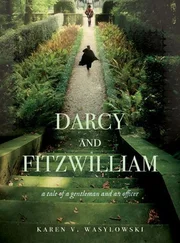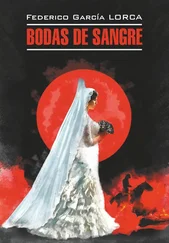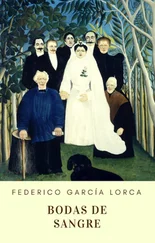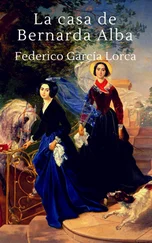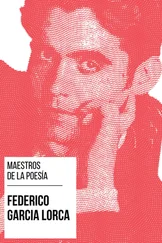Evidently you were wrong. No one, except the dead, can ever understand hell. This is the only eternal truth and, at the same time, the most idle gossip.
You believed everything was a fleeting part of this kingdom, reduced here to a simple memory, which you can witness on the stage in your theater whenever you please. Perhaps we can deduce an obvious lesson, like the ones in the moral texts of your parents’ little schools, and with similar consequences. All of you imagine death, like life itself, as the creation of your dreams. You make man the measure of all things, including eternity. Bluntly, he is not the proportion or scale of anything. His dream of hell is merely a phantom, one of his shades, on this spiral that is the other universe.
When you reached the station, you got out of the taxi, Rafael carrying your suitcase. He was astonished that the driver drove away without waiting to be paid. You weren’t surprised. It was written that the gentleman would pay in any case and that man, who had waited for the two of you so patiently at the door to Cook’s and in front of your house, had fulfilled his ordained role in your destiny. You still lacked time and space for your sacrifice. You lacked them with nothing left over for you to be killed or your martyrdom repeated, for the dual sensation of a steadily diminishing period of time remaining, and events already experienced, acquired greater intensity on the platforms. With almost oppressive detachment, exhausted by the burden like the gigantic ape in your nightmare, you made an effort to correct all that had been written.
“Rafael, you really won’t decide to come to Granada with me?”
“Really, I decided right now,” he said with a smile. “Would the gentleman care for anything else?”
“Nothing else, I ought to make the rest of the trip alone, if I’m obliged to undertake it at all.”
“As you probably realize, I couldn’t reply in any other way.”
“And I couldn’t fail to ask this time, though it may seem incredible to you.”
“All right, man, all right. Let’s not make another Roman tragedy.” Your sleeper was at the end of the platform, two or three cars behind the locomotive. In the station, as on the streets filled with peddlers, Madrid rejuvenated and became provincial in a way Granada never was. You were pleased to confirm it, in spite of your state of mind. You definitely had not lost your capacity for observation, which had brought you to Góngora’s many years before Dámaso Alonso attempted to reveal it to you. Seeing clearly was thinking clearly at any moment, as Ortega said in his first book. Along the platform a man dressed in khaki pushed his two-wheeled cart filled with grenadine drinks, sodas, candied almonds, chocolates in tins painted with the canals of Amsterdam at dawn and the bell tower of San Giovanni, in Montepulciano, the one whose clock had been stopped at exactly 12:00 ever since a day in 1452 when Leonardo was born in Vinci. Granadina , grenadine, you thought in a parenthesis as you looked at those reds like the recently liquefied blood of San Gennaro, was also the flamenco song of Granada. The one you tried to express as a long sad onomatopoeia of the course of its rivers in one of your early poems. But granada , the pomegranate, was also the fruit of the shades in the kingdom of the dead, the one Ascalaphus saw Persephone eat, when Hades abducted her to his domain in the heart of eternity and the center of the earth.
At the end of the platform, Madrid retraced its steps until it returned to the time of vaudeville, outdoor festivals on the eve of a holiday, vernacular operettas, and pasodobles in La Bombilla for the banderilleros and flashy girls of another day. (“Did you know a great-grandmother of mine was the sister of the great Máiquez?”) Peasant women in incredible long skirts and kerchiefs tied beneath the chin in a tight square knot ran, laughing and shrieking, toward a train waiting for them patiently. Their livelier husbands, rustics in their Sunday best though it was Thursday, button caps pulled slightly to the left, ironed handkerchiefs around their necks, and tight trousers, followed them. The women had empty straw baskets on their arms, in which they may have carried a capon or a speckled hen. The men grasped walking sticks as slender as reeds, similar to the ones barkers used at raffles, which they wielded in the air with many flourishes of their dark wrists.
A sense of imperative symmetry, as those people passed by, obliged you to evoke the first time you saw Madrid. It was in the years before the European war and in a time as distant now as the Rome of Scipio Aemilianus. Your parents took you and your brother and sisters in a delayed fulfillment of an almost forgotten promise. As if you were figures in a daguerreotype, you all appeared in Retiro Park on another morning in an uncertain, early summer. The girls almost shivering in their white dresses with big yellow ribbons in their hair. Your brother and you in knit ties with large knots and one-button jackets fastened almost in the middle of your chests. They showed you the statue of The Fallen Angel , the only monument to the devil in the world, as your father said emphatically, when Machaquito and Vicente Pastor passed by in an open hackney carriage. You recognized them right away because you had seen them a few times in the bullring in Granada and many more times in the illustrations in La Esfera and Mundo Gráfico. Machaco had the dull air of a Cordoban impresario or a bookkeeper who had suddenly become wealthy. Beside him, like a giant, his body, arms, and face long, his broad smile, and protuberant bluish jaw, the very Madrilenian Vicente Pastor, the Kid in the Smock. There was no trace or memory left of the work-man’s smock he had worn to his first amateur bullfight. Still, upon seeing him dressed in his Panama hat and high buttoned boots, his tight vest, trousers, and short jacket, a white silk handkerchief around his neck, a watch chain with three loops across his chest, and a full-blown carnation in his lapel, you were overcome by the certainty that even in your earliest childhood you knew, clearly and powerfully. One day, you told yourself, after many years you would remember the carriage driving the bullfighter through the park. Until then your memory of him in the Madrilenian morning, including The Fallen Angel , would lie dormant, preparing for the appointed hour. When that came, it would be returned to you, as the stereotype plate is revealed in the developing tray, to give meaning and fulfillment to a time as irrevocable and irreversible as the water in rivers.
And now Vicente Pastor was returning. The relic of your memory of him suddenly glimmered and identified with the good-looking men in traditional dress, with their starched handkerchiefs, tight trousers, and caps pulled down on one side. One was also the Kid in the Smock with the peasant women in their Gypsy skirts, baskets still warm and redolent of speckled hens on their arms. Everything shuffled together and confused to give you the image of the other Madrid, the one of sea and river crabs hawked in the streets along with cheeses from Miraflores and cakes from Astorga, just as you saw it that morning in your childhood and were witnessing it again now, complete and alive, almost as a loan. The death throes of the Madrid of bull-fighters in open carriages and flashy men and women at open-air festivals were coinciding with yours. That entire world, heir to Goya’s cartoons for tapestries through various avatars, would end forever as soon as the streets and fields filled with dead bodies, as you had just predicted to Rafael Martínez Nadal.
In the Retiro they were exhibiting old French impressionists. All of you stopped in front of Monet’s La Gare Saint Lazare. Your father shook his head, a scornful smile spread to his jaws, and he asked what the devil that blur was. He understood perfectly well that after centuries painters cannot paint as Murillo did in his time. He also had known Moreno Carbonero, the great artist of Málaga, and he understood and appreciated art. This was why, this was precisely why, he grew increasingly sure of himself, he denounced these frauds by impostors who did not know what to do to attract attention. Your brother and you answered immediately, expressing much more admiration for the painting than the two of you felt. Even though he was normally ill-tempered and did not tolerate arguments, he took almost no notice of your dissent. He merely shrugged his shoulders, which the years had not bent, taking into account your innocence as well as your ignorance. The girls were silent, and as if she were talking only to them, in a quiet, unhurried voice, your mother began to tell them that Monet did not intend to represent the world of surfaces, contours, and volumes (she was on the point of adding, “the world that, after all, we don’t see but imagine so we can understand one another,” but didn’t dare to in order not to enrage your father, who so far was listening to her with the same studied indifference he used when listening to you), but the other world, the one that light and shadows transform constantly. “His intention, like Velázquez’s in the Meninas we saw yesterday in the Prado, was to capture a fleeting instant: one of the unnoticed, evolving moments that come, pass, fade, and together constitute our brief lives. To create this painting, constantly fluid and in transition, Monet used very short, thick brushstrokes that stand out perfectly in the picture, the kind we pointed out to you in Las Meninas. Needless to say,” your mother concluded, “the similarity is not accidental, if we keep in mind that both Velázquez and Monet were trying to represent a pause in time. Velázquez, the instant in which the lady-in-waiting offers the princess a vase, and Monet the arrival of the train puffing smoke at the far end of the Saint-Lazare station.”
Читать дальше
